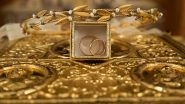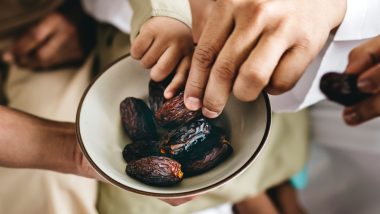The Holy Islamic month of Ramadan or Ramzan will begin from May 6, 2019, in the Middle East and in the United Kingdom. In India, Muslims will observe it from May 7, 2019 onwards. Muslims around the world will observe fasting also known as Roza for 29 -30 days depending upon the sighting of moon for Eid-ul-Fitr. The fast in Ramzan begins by waking up early in the morning for Sehri, which end just a few minutes before Fajr Namaz and it is broken by eating dates in the evening which is known as Iftar. Now the question arises why dates are eaten during the month of Ramadan. Let us explore the religious and health benefits behind it. Let us explore the religious and health benefits behind it. How to Workout During Ramadan 2019: Diet Plan and Easy Exercise to Avoid Muscle Loss As Well Lose Extra Fat.
Religious Reason Why Dates are Eaten
With Ramzan at the doorsteps, one thing that every Muslim household stocks up on is dates or khajur. Prophet Muhammad SAW (PBUH), recommended eating dates during Ramzan: “Break your fast by eating dates as it is purifying.”
Muslims are supposed to follow the principles laid down by the Prophet SAW which is known as Sunnah. Prophet Muhammad (PBUH) used to break his fast with either a few fresh or dried dates or a sip of water.
Health Reasons Why Dates Are Eaten During Ramadan
A study published in 2003 by the International Journal of Food, Sciences and Nutrition names dates as an ideal food, providing a wide range of essential nutrients and potential health benefits. The study concluded dates have at least 15 minerals, numerous amino acids and a fairly good amount of unsaturated fatty acids which are essential for our body.
As per the reports of the National Institute of Health, dates have a low glycemic index (GI, which makes the blood sugar rise at a steady rate instead of quickly.
Health Benefits of Dates
1. As dates are eaten at the beginning of Iftar when the fast is broken, it keeps you from overeating by filling you up with energy.
2. Dates are easily digested and do not upset the stomach of the person who is fasting.
3. Dates provide a good supply of sugar and energy to the body and also acts as a vital nutrient for the brain cells and nerves.
4. Dates prevent constipation as there is a change in eating pattern in Ramzan also one does not eat much fibre during the fasting month.
5. Dates can protect us from lots of diseases like diabetes, gout, renal stones, gall bladder inflammations, high blood pressure and haemorrhoids. This is because of the presence of alkaline salts in it, which stabilises the acidity of the blood due to a large intake of meat and other carbohydrates during Ramadan.
6. Dates are said to have 10 elements which are crucial for humans to stay healthy and fit. The sugar in dates is fructose as opposed to glucose, and does not lead to weight gain. Vitamin B6 soothes the nerves and is abundant in dates.
7. Eating dates after a long day of fasting can help the body’s blood glucose levels quickly return to normal.
8. Dates also strengthen bones and can help in fighting diseases like osteoporosis.
During the month of Ramadan, people usually complain of headache and dizziness while they fast, due to low level of blood sugar. By eating dates, the sugar levels are restored at the start of Iftar. That's why it makes a lot of sense to eat dates during the holy month of Ramzan.
(The above story first appeared on LatestLY on May 06, 2019 01:06 PM IST. For more news and updates on politics, world, sports, entertainment and lifestyle, log on to our website latestly.com).













 Quickly
Quickly


